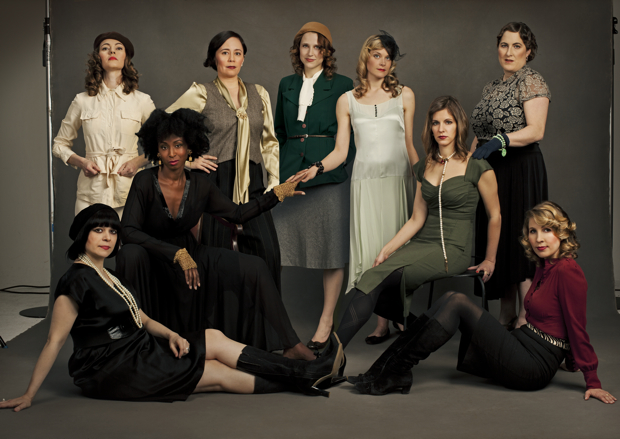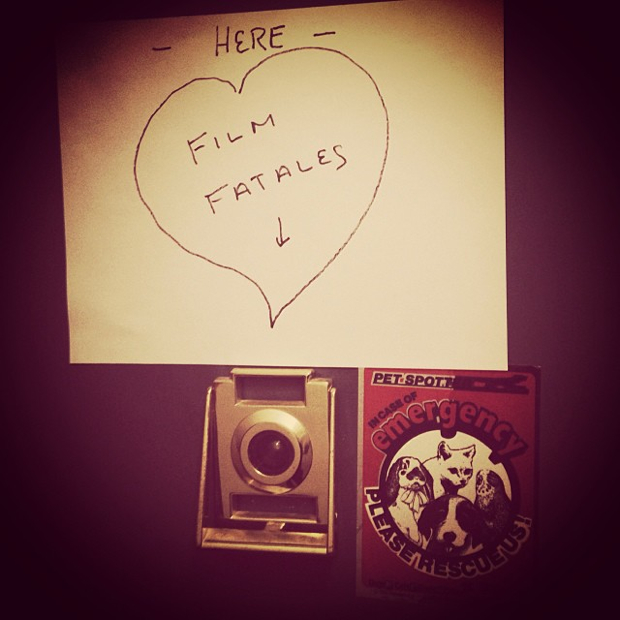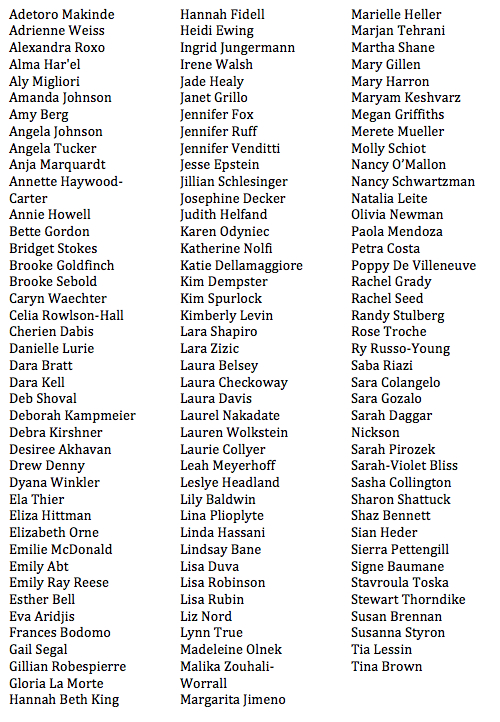 Back to selection
Back to selection
A Collective Will
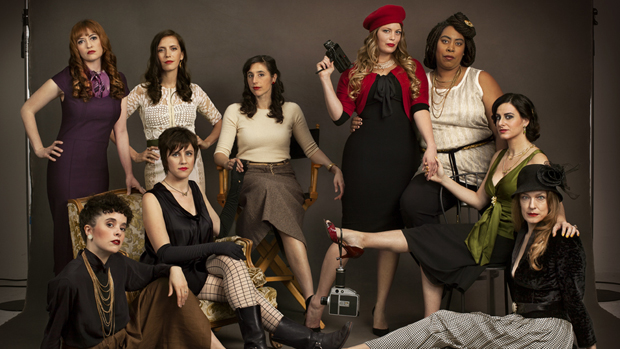 Marielle Heller, Malika Zouhali-Worrall, Paola Mendoza, Leah Meyerhoff, Danielle Lurie, Drew Denny, Angela Tucker, Laura Checkoway, Deborah Kampmeier (Photograph by: Danielle Lurie; Stylist: Jennifer Kirschman; Make-up: Vesta Goodarz; Photographed at Hayden 5 Studios.)
Marielle Heller, Malika Zouhali-Worrall, Paola Mendoza, Leah Meyerhoff, Danielle Lurie, Drew Denny, Angela Tucker, Laura Checkoway, Deborah Kampmeier (Photograph by: Danielle Lurie; Stylist: Jennifer Kirschman; Make-up: Vesta Goodarz; Photographed at Hayden 5 Studios.) “Never doubt that a small group of thoughtful, committed citizens can change the world; indeed, it’s the only thing that ever has.” — Margaret Mead
“You are cordially invited to the first installment of Film Fatales — a monthly get together of amazingly talented female filmmakers,” began the email I received from Leah Meyerhoff soon after I moved to New York. “We are reaching out to you because you have written or directed a feature film and we hope to share in each other’s talent, stories and laughter.”
This email came after several conversations Meyerhoff had with veteran filmmakers she admired while creating her first feature film, I Believe in Unicorns. “I was calling every filmmaker I could think of for advice — Kimberly Peirce, Allison Anders, Lynn Shelton — as part of my development process,” she says. “So many women were so generous with their help and their time that it started the wheels spinning about getting a group of us together.”
The next week a handful of women — Emily Abt, Ry Russo-Young, Deborah Kampmeier, Esther Bell, Alexandra Roxo, Paola Mendoza, Meyerhoff and myself — met for some wine and appetizers at Meyerhoff’s apartment in Brooklyn. At the meeting, Meyerhoff put it simply: “Being a female filmmaker is hard, and I think we need to stick together.” She had us go around the small circle and say who we were, what films we had made and what we were working on. We then talked about the challenges facing us as female filmmakers, the need for a group like this and how it could work. Sharing our stories to a group of our peers felt empowering and also relieving.
We ended the meeting by going back around in a circle and saying one specific thing we needed help with. This part was fascinating. Not one woman could finish her “ask” before another woman had a solution for her. If one woman needed a D.P. for her next film, someone else had one to recommend. If someone needed funding for their niche movie, another woman knew a funder that happened to care deeply about that very topic. If someone needed help learning how to shoot their new 7D camera, someone else knew how to teach them. We left the meeting agreeing to meet the first week of every month, at the home of a different filmmaker each time.
We were onto something. Two years later our group, Film Fatales, is over 60 female filmmakers strong. “Although the problems facing female filmmakers seem daunting, what we can do is help each other make our films,” says Meyerhoff.
Within those early meetings and conversations bubbled the beginnings of what I’m going to call a female filmmaker revolution. Born out of a need to change the socioeconomic paradigm, revolutions are designed to create a fundamental change in the way we as a society think about or visualize something. In the film industry — where, according to the recent 2014 Sundance and WIFLA Study, just 2% of the 2013 top-grossing box office films were helmed by women — the need to shift away from this male-dominant paradigm is necessary if women are to continue on as filmmakers.
“It’s harder for female directors to raise money. It’s more work to be taken seriously on set. Less women are nominated for awards so they are less likely to win,” Meyerhoff posits. “Women are told they are not assertive enough, or disliked for being ‘too controlling.’ Female filmmakers are often branded ‘difficult’ or ‘crazy’ when male directors in similar circumstances would be labeled ‘eccentric’ or even ‘genius.’ Women are more likely to write stories with female lead characters and then told that those kinds of films are less likely to sell.”
Meyerhoff is not alone in thinking women face a Sisyphean plight toward filmmaking equality. From my research and interviews (and personal experience), there are few female filmmakers who have not felt defeated by one or more of the issues she mentions. “The film game is tougher for us. If we’re going to win it, we need to get in each other’s corners and root hard,” says Abt, director of the Sundance feature Toe to Toe.
“The blockades in this industry could make you go mad, question every fiber of your being, make you feel like an impostor despite your achievements,” echoes Frances Bodomo, whose past two shorts have also premiered at Sundance. “That’s how oppression works: psychologically.”
Almost every Fatale that I interviewed for this piece said that one of her toughest challenges was going at this solo. “I don’t think that people outside of the industry realize how truly ‘independent’ indie filmmaking can be,” says documentarian Liz Nord. “Parts of the creative process and research, writing, and fundraising can feel isolating and downright lonely.” In an attempt to keep women working in film, one idea Meyerhoff had in forming Film Fatales was to create a support network to remedy this isolation-born frustration. “We figured that if we could create an environment that would bring like-minded people together, it would be a reminder that we are not in this alone,” she says.
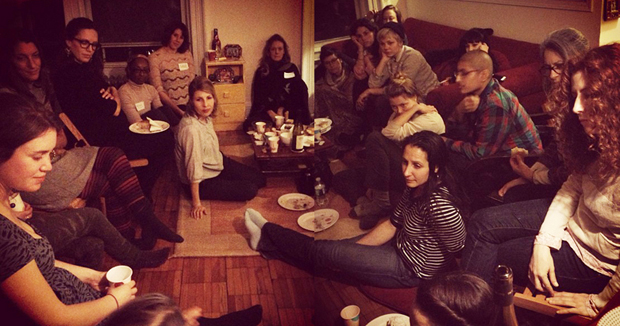
“The monthly meetings are kept small so that discussions can be intimate and lasting relationships formed,” explains Meyerhoff. “The host provides the discussion topic, which has ranged from the esoteric — ‘What is the role of the artist in a time of crisis? or, ‘What inspires us to make films?” — to the practical: ‘Rehearsal techniques’ or ‘Communicating with cinematographers.’ We all sit in a circle as equals, and the meetings are structured so that everyone gets a chance to speak. At the end, we break up into smaller groups and help solve each other’s immediate production needs.”
“I walked into my first Fatales meeting with sweaty hands, a bottle of red wine and a mean case of butterflies. I didn’t know anyone there except the woman who invited me,” Gillian Robespierre, director of the recent Sundance film, Obvious Child, recalls of a gathering at Russo-Young’s apartment. “I buzzed the downstairs door. A woman opened a window and lowered a key that was tied to a string and told me to walk up to the second floor. I was seriously contemplating leaving. But I’m glad I didn’t because I stepped into the most incredible-smelling apartment. We sat around a long dining table and talked about movies: our experiences on them, writing them, funding them, editing them. It was explosive. The following month I mentioned that I was looking for 1st AD recommendations, and by the time I got home I had a list. By the end of the week I hired Laura Klein.”
Indeed, the Fatales have become a self-sustaining ecosystem of support. “Out of Film Fatales, I have found a color correctionist, have found new friends, and have gotten to laugh about the things that feel like they might break me sometimes,” says Josephine Decker, who recently had two feature films screen at the Berlin Film Festival. Documentary director Malika Zouhali-Worrall was nervous before her theatrical release of Call Me Kuchu (which she co-directed with Katie Fairfax Wright). After a meeting, a fellow Fatale offered to share the film with a major celebrity (who has three million Twitter followers) who then tweeted about the film the day before its release. Documentary feature director Angela Tucker noted that she had shot a short film this past summer. “It was my first fiction short in a long time,” she said. “I was nervous and it was so nice, whenever I had questions, to be able to ask them to this supportive community.”
Deborah Kampmeier, director of Virgin and Hounddog, has leaned on the Fatales for some tough love. “I was moaning and groaning in a meeting about financing falling through once again for a feature I was trying to put together with a large budget,” she mused, “One of the Fatales asked if I could make it for less money. An obvious question but one I kept refusing to ask myself […]. I think I would have stayed stuck for many more years of waiting on financing if I hadn’t been in the group. I gained clarity in the group. And courage. And made my third feature, Split, which I’m currently in post-production with.” And for myself, taking the photos for this article would not have been possible without several Fatales showing up to help me produce what became a very large-scale (and very fun) photo shoot.
“I like having a gang,” Stewart Thorndike, director of Lyle, says of the Fatales. “It makes everything feel more doable and makes me feel more powerful.” Russo-Young agrees, saying that “it’s comforting to know we’re all going through similar processes, whether it be negotiating a deal, recommending a colorist or the emotional balance between the industry and making work you really care about.”
What makes the Fatales an especially valuable collective for women is the psychological safety being amongst our same-gendered peers affords us. “I especially love that we are able to be vulnerable with one another,” says Tucker. Sundance documentary After Tiller co-director Martha Shane feels that Film Fatales provides “a space in which people can be completely honest about the challenges of filmmaking and not feel like they have to be constantly displaying optimism or promoting themselves. And as a result, the conversations we have there are really fruitful, and tend to lead to actual solutions.” Beyond just being comfortable to speak our minds on a personal level, Fatales also provides a safe space for any sort of creative exploration. Filmmaking duo Roxo and Natalia Leite, who co-star in their web-series Be Here Nowish, “admire female filmmakers taking risks and not taking the traditional safe route with their work,” and find Fatales to be a supportive hub for their creative process. “Confidence is so important in this business,” muses Merete Mueller, director of the SXSW documentary Tiny, “and I think it can be easy for women (or anyone) to put up a front in order to exude that confidence. But this is a space where we can all be professional, but also be totally honest and ask for support. And that’s really powerful.”
“There’s an unmistakable bar of excellence from every level of filmmaker without the air of competitiveness,” reflects Adetoro Makinde, whose current feature script has Will Smith attached to star. Since Film Fatales began, members have had their feature films premiere at Sundance, SXSW, Hot Docs, Tribeca, and have been shortlisted for the Oscars. “The talent inside Film Fatales is unlike any other group,” says screenwriter Lisa Rubin, who collaborates with feature director Brooke Sebold. “At Sundance this year, three Fatales who I didn’t yet know directed features. After the screenings I went up to congratulate the directors and said, ‘I’m a Fatale too.’ And it was like a secret code word. To me, it means we are on the same team.”
“Film Fatales has created a network of influence, inspiring each other to reach their potentials and driving group progress, tapping into the ‘rising tide lifts all ships’ theory,” says Amy Hobby of Tangerine Entertainment, which only produces films by women filmmakers. Kampmeier says the Fatales “is becoming a go-to group when producers are looking for a woman director, which I predict will soon be quite the fashionable thing to do.” Several other Fatales also reported being connected with producers and financiers that they would not have met otherwise. In this regard, Film Fatales “is redefining the archetype of what a director is and looks like,” says Laura Belsey. “We are supporting each other and normalizing the concept of female directors.”
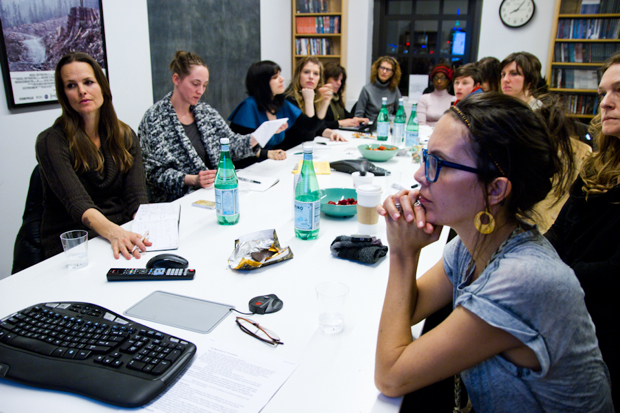
Film Fatales also offers support to female filmmakers in ways beyond monthly meetings. Members Hannah Fidell, Emilie McDonald, and Kim Spurlock formed a Fatales Writing Group, which meets monthly at the WGA-East. Dara Bratt has helped coordinate special events such as a recent outing with Tangerine Entertainment to support the release of Sarah Polley’s Stories We Tell. In addition, Mendoza and Makinde organize Fatales Master Classes, taught internally by a Fatale who is an expert on a topic and hosted at a space donated by the Tribeca Film Institute. “After the last Master Class lecture on a fantastically cold night in Tribeca, everyone was leaving and they had this power and glow and energy that made it seem like we could do anything,” reflected Thorndike. “It sort of seemed like we should go rob the Weinsteins right there on the spot, divvy the loot and each make a film.”
Film Fatales is also swiftly becoming a great resource hub for all levels of production. With so many experienced filmmakers as members, the group has an extensive resource list to draw from, spanning pre-production to distribution. It is also forming an online collection of member films available for festival screenings and distribution. And with a new website (www.filmfatalesnyc.com) the group hopes to make it easier for the film industry have easier access to women filmmakers. “My experience being able to see a large collection of female filmmakers on one website was a dream come true,” says indie producer Helen Vonderheide. “You don’t get something like that from calling an agency.”
While Film Fatales has been a success in terms of empowering female filmmakers, the question now is one of scalability and sustainability. As with most grassroots movements in their nascent stages, it’s not always easy to manage a swiftly growing organization, especially when all its members are working directors. “It’s like trying to co-direct a feature each month, multiplied by 20,” laughs Meyerhoff. Indeed, Film Fatales has grown faster than could have been imagined, and with the combination of speedy growth and limited resources come challenges. While it is Meyerhoff’s wish that every female filmmaker who has made a feature film be able to join, the practicality of this large-scale inclusion without proper financial support is not yet feasible. Intended to benefit all female filmmakers, it is a frustrating irony for a support network to often need to withhold support due to practical concerns.
In a positive step forward, Meyerhoff recently brought on Brown University graduate Aly Migliori to help with logistics. It is the hope that with more woman-power this group can sustain itself without the monthly involvement of Meyerhoff, who is beginning her festival tour following the SXSW premiere of I Believe in Unicorns. And as the group becomes more sustainable, more monthly meetings can pop up in New York City and elsewhere around the world.
Of the relationship between her own directing and the decision to create Film Fatales, Meyerhoff says, “Part of the reason I initially became a filmmaker was to add to the cultural landscape by creating stories with strong and realistic female leads. Young women and girls look to the media when forming their identities and the more role models available to them, the healthier our society will be as a whole.” Indeed, studies show that the more women there are making movies, the more movies there will be about women, and the more women will be working in film. And if women do better when supported by their peers, then what we need is groups of women forming everywhere that can support each other like the Film Fatales.
“We need all the help we can get. And advice, support, encouragement,” says director Catherine Hardwicke (Twilight) of the importance of Film Fatales. “Some days the battle seems too daunting, but then one positive flaming arrow shot into your heart by a pal can reignite the blaze. It can feed you fuel and courage to keep going — to tell stories that need to be told!” Mendoza echoes this need to support each other. “Being a filmmaker is hard, we all know that. Being a woman filmmaker is harder,” she says. “Hard does not mean it can’t get done, it just means you have to have the strength and perseverance to get to the end. I know I can’t do it alone, I know I need my family, my friends and my community of women to help me get there. So when I walk through the door of success it’s not just me walking through that door, it’s all the people that have my back.”
“Nothing changes without a movement,” says Sunlight Jr. director Laurie Collyer, “and clearly a lot needs to change in terms of how much power we have in the entertainment business, how many big budget films we direct or even how many films we direct at all. Movements make change, not individuals.”
Indeed, a movement is forming, and it’s a good one. It’s a movement where we women admit we are stronger together than apart. It’s a movement where women support each other to make films, hire more women, and get more stories about women told. Film Fatales gives female filmmakers a bedrock, a foundation, a jumping off point to make our films and live our dreams. “Half of our society is women. Half of the audiences are women, half of the creative content needs to be made by women,” concludes Meyerhoff. Film Fatales encourages all women filmmakers to come and take a seat at the film industry table and have your voices heard, because yours are the voices audiences have been waiting to hear.
If you’re a female filmmaker interested in starting a local chapter of Film Fatales, please email us at filmfatalesnyc@gmail.com
